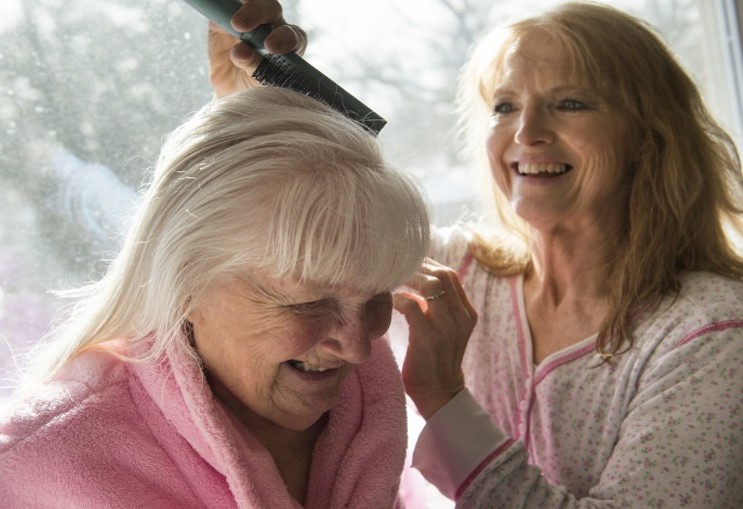
Why Humor is so Critical During End of Life Care
National Humor Month is upon us, a time to heighten public awareness of the therapeutic value of humor. Laughter and joy – the very bedrock of humor – leads to a boost in well-being, morale, communication skills, and quality of life. Humor isn’t just about laughing and having fun, although that’s a big part of it. It’s an effective tool to lift plunging spirits, a well-established notion that’s supported by scientific research. The curative power of laughter, along with its ability to relieve stress and burnout, may just be one of the greatest medical discoveries of our time. While end of life care can be stressful, sad and overwhelming, it can also offer up glimpses of hope through moments of humor. Let’s explore why humor is so critical during end of life care in San Mateo and elsewhere.
The Research
According to one study published in the American Journal of Hospice and Palliative Medicine, laughter and humor can fulfill one of the main goals of hospice palliative care, which is the improvement of a patient’s overall quality of life. Another study appearing in ScienceDaily found that humor, when combined with scientific skill and compassion, offers a humanizing dimension in health care that offers real value to both patients and caregivers. It went on to say that humor played a critical role in the promotion of team relationships while adding a human dimension to the care and support that staff members offered to seriously ill patients and their families. The study also found that humor by staff members and caregivers can be used to:
- Alleviate difficult situations.
- Reduce patients’ embarrassment when needing help with the toilet or other personal functions.
- Connect with patients, making them feel cared for as individuals.
- Reduce tension when things don’t go as planned.
- Connect with other healthcare professionals, providing a level of mutual support.
- Cope with difficult situations.
- Create a bit of distance when emotions run high.
Humor has also been found to alleviate pain. According to the Journal of Aging Research, humor releases endorphins in the brain, which help to control pain. It can also reduce loneliness among older persons suffering from chronic pain.
Humor: The Glue Holding Human Connections Together
For many people who are faced with accepting end of life care, the process of dying comes with less stress when it can be approached as something of a laughing matter. Not funny ha-ha, per se, but at its simplest, this type of humor is a kind of willingness to occasionally make light of the peculiarities and even absurdities that are often part and parcel of end-of-life situations. One patient quoted in the Chicago Tribune put it this way: “While death cannot be cured, your frame of mind is something that you can change.”
Humor, especially during extremely stressful moments, has the benefit of acting like a “release valve,” relieving tension — if even for a moment — so everyone can re-set and re-evaluate. It is indeed the glue that holds vital human connections together.
Therapeutic Humor
Laughter is a healthy thing, a positive thing, for everyone: caregivers, family members, patients, hospice care providers, etc. It can be especially valuable for those who witness people dying every day. They need that laughter, that release. The connection between humor and health is recognized by the Association for Applied and Therapeutic Humor, a group started by a nurse and includes people from a variety of backgrounds, such as scholars, psychologists, nurses, and doctors.
This group defines therapeutic humor as any intervention that promotes health and wellness through the stimulation of playful discovery, expression or appreciation of the absurdity of life’s situations. We all know how close a relationship there is between laughter and tears. Have you ever laughed so hard, you cried? When you share that with someone, you’re forming a close connection, offering relief from the stress and anxiety of the situation, says the Star Tribune.
Many hospice care providers say that when a patient can laugh about their situation, they are beginning to accept their fate and are beginning the process of coping with it. To that end, humor is indeed a coping skill that is vital for those going through any kind of difficult situation.
That all being said, there is a limit to when humor is acceptable. It’s a balancing act, with its use and frequency depending greatly on the family and patient. If someone is angry and unwilling to talk or laugh about things, as a caregiver, you have to honor that.
Contact Pathways Home Health and Hospice
To learn more about our hospice care, please contact us at 888-978-1306. Our caregivers know the value of professionalism and skilled care, but we also know how important it is to find humor in everyday life, even when stress is at its highest. Please give us a call if your loved one is in need of end of life care in San Mateo and elsewhere.

